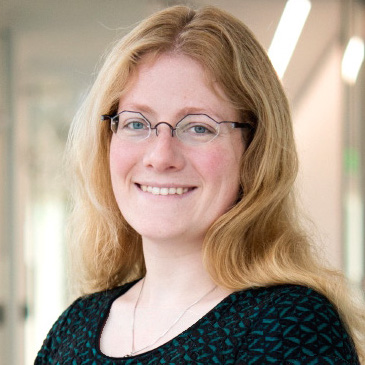How one scientist’s curiosty led her to the Hariri Institute
BY: GINA MANTICA
Allyson Sgro explored many different career trajectories and research fields before landing in academia.
Sgro’s fearless pursuit of her passions led her from considering a path running her own scientific small business to getting degrees and post-doctoral training in chemistry and physics. The interdisciplinary nature of her current work to understand how groups of cells make decisions and cooperate is a product of her curiosity and determination.
By following where her unique interests led her, Sgro now dedicates her time as a Junior Faculty Fellow at the Hariri Institute and an Assistant Professor in Biomedical Engineering to both understanding the lives of tiny, individual cells and inspiring her students to stay true to themselves — no matter what.
Sgro’s passion for understanding how single cells join forces and work together can be traced back to her dad. Her father was a neurologist by training and loved to chat with Sgro about how the brain processes information. “The brain just came up a lot as a topic growing up, and it seemed like this very interesting thing. So it got me thinking a lot about neuroscience as a place that I might like to be,” she said.
Her dad’s career also prompted Sgro’s interest in academia. His small business was borne out of his academic work. As a graduate student, Sgro admired the flexibility and independence that running a small business granted. “I used to really think I wanted to run a small business. I liked seeing my father do it, and I liked the idea that I’d both be in charge of the science and own it,” said Sgro, “But at some point in my career, it became clear that being an academic is similar.”
Sgro’s journey to academia was also supported by her experiences with writing. As an undergrad at Bard College at Simon’s Rock, she wrote about everything, including math. “Writing has been very helpful for me as a scientist to think deeply about my ideas and how to convey them,” she said.

Later on as a Scientific Writing Fellow at Princeton University, Sgro worked with an inspirational mentor that changed the way she thought about science.
During her faculty job search, Sgro only had a short time to prepare and struggled to create her talk for academic job interviews. She turned to long-time mentor, Judy Swan, the Associate Director for Writing in Science and Engineering at Princeton University, for help finding a narrative for her talk. Swan encouraged Sgro to embrace her personal journey in the sciences. “It became clear from my conversations with Judy that I was trying to tell a science story rather than my story,” she said.
Sgro forged a unique research path by incorporating ideas from all the different disciplines she encountered during her career. Drawing inspiration from neuroscience to think about how cells beyond the brain work together, the multi-disciplinary nature of her work eventually led her to the Hariri Institute.
Now, she encourages her own students to experience every part of their projects — from conceptualization to analysis — so that they can forge their own paths. “There is no typical day. What I really push in my lab probably makes things take longer, but I think getting to own each piece like that is the fun part,” she said.
Sgro’s work has continued both in the lab and at home throughout the pandemic. Her lab has even set up an analysis-machine home delivery service for when students need additional computational power to study how their cells are working together to complete tasks.
COVID-19 may have changed the way that people work and live. But chasing one’s dreams doesn’t need to stop because of a virus. “Keep staying true to yourself and figure out who you are,” advises Sgro. “Be able to convey who you are and what makes you unique so unique doors will open for you.”
Interested in learning more about the transformational science happening at the Hariri Institute? Sign up for our newsletter here.
